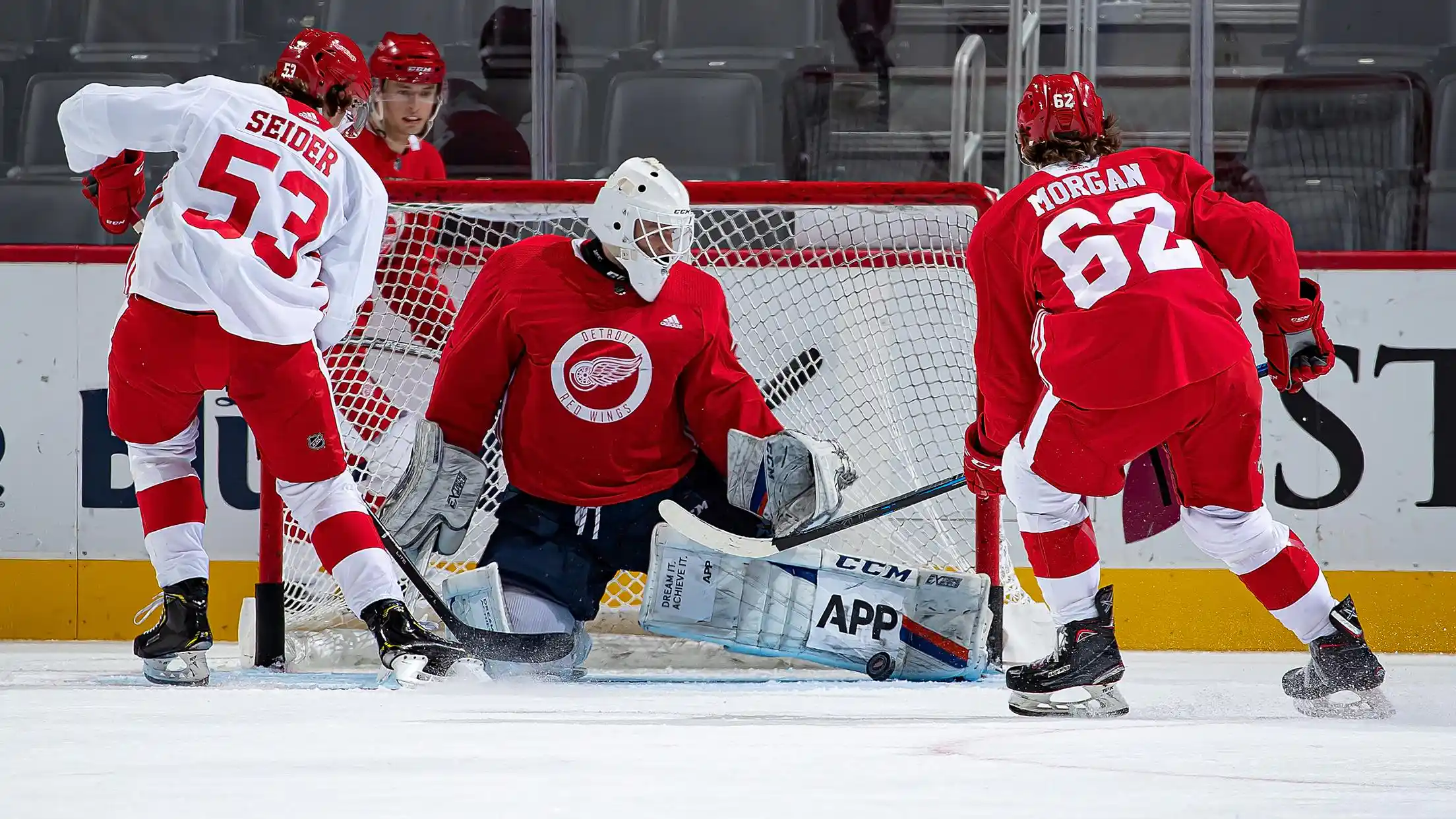Remembering Mr. Ilitch – Part One: Paying Respect to the man who Treated Detroit like Family
By Cam Lewis
7 years ago

Rick Osentoski-USA TODAY Sports
This is part of a three-part series recognizing and reminiscing on the impact that Mike Ilitch had on both the Detroit Red Wings and the city of Detroit as a whole.
Mike Ilitch treated Detroit like family.
Over the past week, it’s been made clear that the people of Detroit — those who have been touched by his generosity, his spirit, his creativity, his ability to see and strive for greatness, and both his passion and compassion — echoed that sentiment, as hundreds poured into his public funeral to offer sentiments of gratitude to the man who built Hockeytown.
Ilitch passed away last Friday at the age of 87. He was the son of Macedonian immigrants who perfectly represented the ideals of the American dream. After a career in the United States Navy and as a professional baseball player, Ilitch and his wife Marian started a company known as Little Caesars Pizza Treat.
The company saw great success, and in 1982, Ilitch used his financial capital to purchase the down-and-out Detroit Red Wings, who has become known as the Dead Things since the retirement of the legendary Gordie Howe. In under a decade, Ilitch transformed the Red Wings from the laughingstock of the league into a contender, which ultimately led to the franchise becoming one of the most dominant dynasties ever seen in North American professional sport.
But beyond his success in entrepreneurship, business ventures, and with the Red Wings is the legacy of a man who was revered by virtually everyone who had the opportunity to work with him.
“It spilled down from the way he treated you, it was like family,” Scotty Bowman, who coached the Red Wings to three Stanley Cup Championships said. “If you needed anything to talk about he was always available and that’s what I felt was the difference. He wasn’t so much a hands-on owner as he was a family man.”
You don’t stumble upon the success that Ilitch saw with the Red Wings — four Stanley Cups and an unprecedented 25-season playoff streak — through dumb luck. Of course, a major ingredient in success is hard work and talent, but a contributing factor is the ability to get the best out of others.
Ilitch was able to get the best out of the individuals who worked and played for him by treating them like family.
“He made you want to be a better man,” Brendan Shannahan, a Hockey Hall of Fame inductee who won three Stanley Cups with the Red Wings said. He was committed to doing things right and what he touched in business turned to gold. But he had that presence about him that he made you want to be better.
“He was such a passionate sportsman, but his family always welcomed us. They knew the players. They knew the wives, the girlfriends, the kids. We all got to made feel like we were part of his family. They knew the names of our kids, they knew when someone was going through (a hardship) at home. They took it personal. Mr. and Mrs. Ilitch referred to us as their boys. Sometimes we were 35-40 years old, but we were their boys.”
Bowman had already seen a tremendous amount of success as a head coach in the National Hockey League before arriving in Detroit in 1993. In fact, Bowman likely has the most decorated resume of any coach in the history of the game, owning a 1244-573-314-10 career record with nine Stanley Cups to his name. Bringing him in to push the team over the top was a major statement to everybody involved in the organization that Ilitch was going to equip them with everything possible to succeed.
“When you’re playing for an owner that will give your GM the (permission) to bring in the best player, coach, it tells you you’re taken care of and you’re going to have a chance to win championships,” Kirk Maltby, a fan favourite and member of the Red Wings’ grind line during multiple championships said.
It was that level of commitment that earned him so much respect in the city of Detroit. Sports ownership is a license to print money, especially in a blue-collar town like Detroit that rallies around the excitement and magic of sport. But Ilitch didn’t use the Red Wings to line his wallet, he instead viewed the team as a way to bring pride to the city he loved.
“Ilitch earned the players’ respect by paying top dollar for talent. He won fans’ admiration by exploring every option available to him to land the best player. He embraced free agency long before it was commonplace,” said Kevin Allen of USA Today in a column about Ilitch’s leadership.
“He proved that by continuously overspending in the name of trying to pursue championships with his Detroit Red Wings and Tigers. He was the owner that every fan wants. He wasn’t meddlesome to the point of preventing general managers from doing their job. But he was involved enough to be a major advantage for his club. He rarely, if ever, said “no” when it came to spending money in name of improving his team.”
The Red Wings were basically a ‘who’s who’ of elite talent during the 1990s and 2000s. Their Cup winning teams featured multiple Hall of Famers like the aforementioned Shanahan and Bowman, but also names like Dominik Hasek, Luc Robitaille, Brett Hull, Larry Murphy, and Sergei Fedorov, who certainly didn’t come cheap.
These teams that featured a unique blend of homegrown and raised talent and expensive free agent and trade acquisitions restored pride to the city of Detroit.
“He helped Detroiters feel good about themselves,” Shawn Windsor, a writer for the Detroit Free Press, said in regards to Ilitch. “He spent money in both sports like they do in megalopolis coastal cities. It didn’t always work out, but his largesse reminded us that we weren’t Kansas City or Minneapolis or St. Louis.
We were different. We knew who we were, and so did he.
It takes a certain amount of bravado to buy a professional sports franchise. It also takes discipline — to provide resources, to watch from the shadows.”
But beyond capturing the imagination and restoring a sense of pride and swagger in the residents of Detroit through success in sport, Ilitch used his influence to give back a tremendous amount to the community, both locally and nationally.
The Little Caesars Love Kitchen was established in 1985 to assist in feeding the hungry during periods of crisis and natural disaster. In 2006, he started the Little Caesars Veterans Program, which offered massive discounts to army veterans seeking to purchase a Little Caesars franchise and pursue a career in business management. And, of course, his Little Caesars Hockey Program in Detroit has helped thousands of kids in the area play the sport from a young age up to elite levels.
Being involved with Little Caesars amateur hockey, you see the young players that have been impacted by the opportunity to play with Little Caesars — Mike Modano, Brian Rafalski, Bryan Smolinski, Zach Werenski, Brian Rolston,” Kris Draper, another member of the aforementioned grind line said. “It’s not just the players that went on to play in the National Hockey League, it’s probably doctors and lawyers and teachers and dentists and police and firemen that have played minor hockey. It’s amazing the lives that Mr. Ilitch impacted, at the highest level and the youth level.”
Nolan Finley of Detroit News summarized it perfectly:
“The Detroit on which Mike Ilitch staked his company’s and personal reputations in 1989 was at its historic low-water mark. … Detroit is no joke now. People from all over the world want to come here. To work. To live. To invest. Mike Ilitch started all that. Fans balked when the decision was made to name the new sports complex Little Caesars Arena. The Ilitch family paid for it. They can choose the handle. But I’d suggest it be called the Mike Ilitch Arena. What he did for Detroit should never be forgotten.”
So when you see the volume of people reaching out to offer their respect and gratitude in the wake of Mr. Ilitch’s passing, that’s why. His success as a businessman and professional sports owner is one thing, but his passion for the city of Detroit and compassion for its residents is what transformed him from a legend into a member of the city’s family.
Next Friday in Part Two, I’ll dive deep into the history of Ilitch’s work in transforming the Red Wings from the pit of everyone’s joke to the greatest dynasty in hockey history.
Recent articles from Cam Lewis





